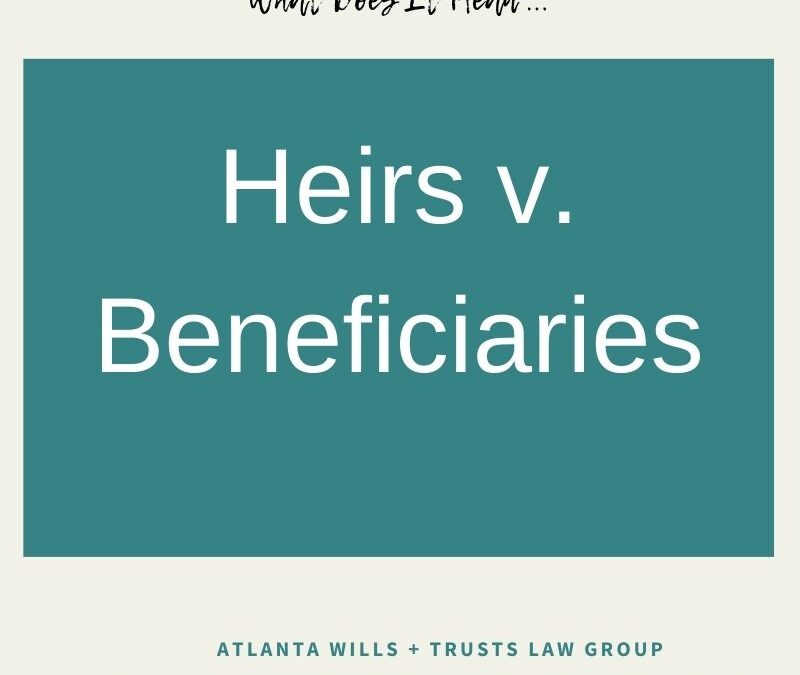Who Is An Heir in Georgia.
There is a difference between a beneficiary and an heir at law.
Here are the definitions:
A beneficiary is: someone is named in a document (in this instance a will) and is set to receive whatever share, item or property identified specifically. This is likely a result of choice (not law).
An heir is a result of the law identifying an individual or class of individual who may or may not have certain rights in an estate because of their relationship to the deceased person. Here is the way the law in Georgia currently classifies heirs. The list below is in order or priority. The list does share what they are entitled to in the estate (share, item or property). This is a different discussion.
- The spouse if there are no children (and no children who died before the decedent leaving living children of their own or descendants of living children)
- The spouse and children if there are children, and the children of any child or children who died before the decedent (as well as the deceased child’s descendants if any of the deceased child’s children also predeceased the decedent)
- The parents if there is no spouse or children, descendants of deceased children, grandchildren, etc.
- If no spouse, children, descendants of children, or parents survived the decedent, the brothers and sisters of the decedent and the descendants of any deceased brother or sister who predeceased the decedent
- If none of the above were living at decedent’s death, the grandparents
- If none of the above, uncles and aunts and descendants of any deceased uncle or aunt, but if all uncles and aunts are deceased, then first cousins share equally, rather than siblings taking their parent’s share
The more remote degrees of kinship are determined by a mathematical formula involving the relative in question and the closest common ancestor. If you have gotten this far, please consult OCGA sec. 53-2-1(b)(8).
Why Is This Important?
Because Georgia law makes a distinction between the two, it is important to keep in mind the two distinctions when planning. During planning, you can disregard heirs in favor of others. Those people, say a cousin or friend or domestic partner, is entitled to what you owned or want to give them after you die because you chose them in your estate plan to receive it. It has nothing to do with how they are related to you by blood or marriage.
After you pass away, however, all beneficiaries and heirs will be notified in the probate process who is entitled to what under your Will. Probate is the legal process by which someone’s estate (what they owned or were entitled to own at death) is administered, or transitioned, to the next person who is entitled to own it. It is a public, court process in which your last will and testament is actually filed with the court in order to even begin the process.
So, through this legal process, therefore, if someone is an heir according to the definitions in the statute discussed above and they are NOT a beneficiary under the will they will know both facts.
Some people, while planning, are 100% comfortable with the fact that an heir will be notified that they have not been provided for in the will. There are many, many reasons for this to occur and these are almost exclusively personal to the client. Others, however, are shocked to find out that a loved one that is an heir, but not getting anything in their will, will be told this fact AND provided a copy of the will in the beginning of the legal process.
So know the difference between who is your heir and who you are providing for in your will, know if there is a difference. It may not impact your decisions, but it is important for you to know.
If you have questions about the planning process, reach out to my team at (770) 508-6525 to set up a complimentary consultation to discuss how we can help you protect who you love the most.
Atlanta Wills + Trusts Law Group by Refeca Law LLC is an estate planning and elder law firm located in North Fulton County and serves the Alpharetta, Roswell, Johns Creek, Suwanee, Cumming, Duluth, Milton areas and surrounding communities.

